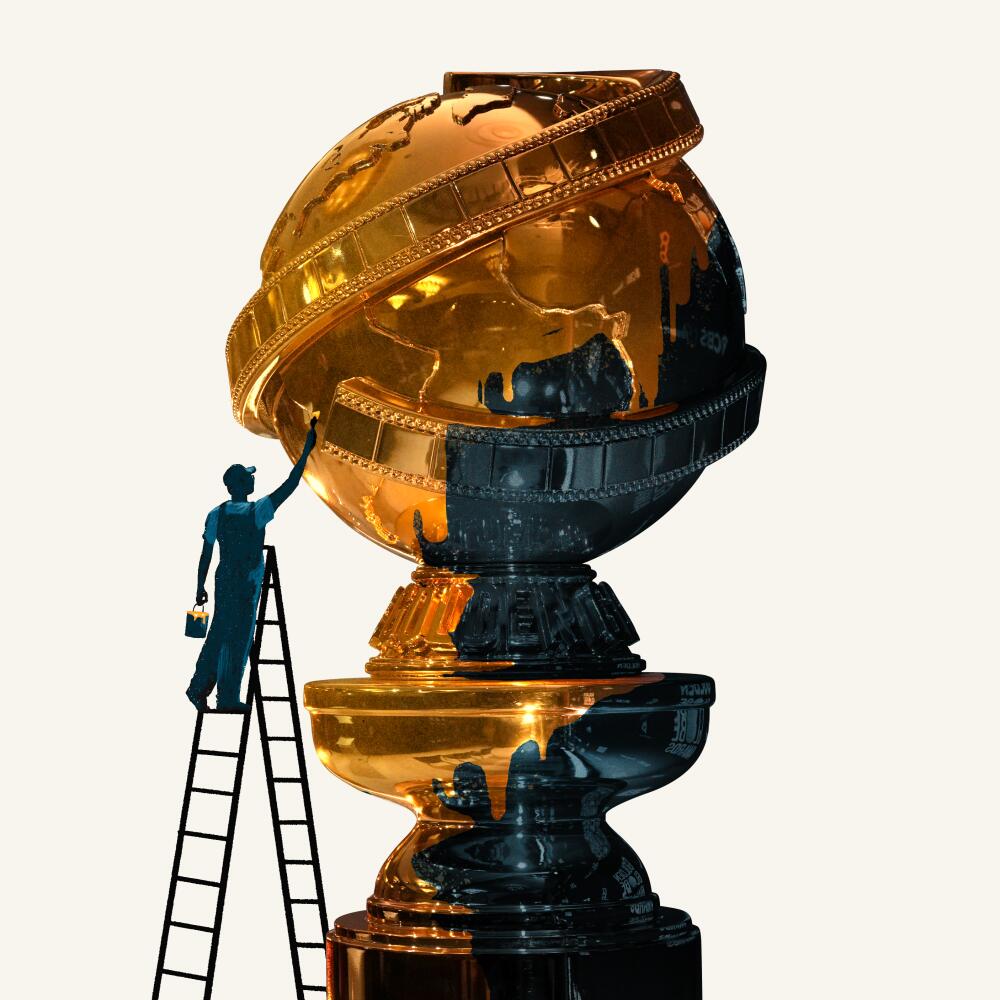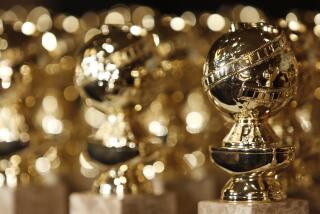
- Share via
There are few things Hollywood loves more than an awards-season comeback narrative — think of Ke Huy Quan and Brendan Fraser at last year’s Oscars completing zero-to-hero career resurrections to cheers and tears.
Sunday’s Golden Globe Awards will offer a novel twist on this age-old story: This time, it’s the show itself that’s looking for a second chance.
Two years ago, the Globes — a buzzy precursor on the road to the Academy Awards — was mired in a potentially fatal public-relations crisis. After a 2021 Times investigation exposed a lack of diversity in the Hollywood Foreign Press Assn., which had long put on the awards, and raised concerns about its ethics and financial practices, Hollywood collectively shunned the Globes. Tom Cruise returned his trophies and NBC yanked the show off the air for a year. Many believed it was time to roll up the red carpet on what had been billed for decades as “Hollywood’s party of the year.”
But the industry couldn’t quit the Globes — and the marketing tool it provides — quite so easily. Now, following a series of sweeping reforms that have remade the awards inside and out, dissolving the HFPA and turning the organization into a for-profit enterprise, the Golden Globes have found a new home on CBS, and organizers say the party is very much back on. At a time when the film industry is still struggling with deep existential anxieties — with domestic box office down more than $2 billion last year from pre-pandemic levels — for many in Hollywood the impetus to look past the Globes’ rocky past is simply too strong to resist.

Subscribers get exclusive access to this story
We’re offering L.A. Times subscribers special access to our best journalism. Thank you for your support.
Explore more Subscriber Exclusive content.
“I think everyone has bought in,” says Ricky Kirshner, who is serving as the telecast’s executive-producing showrunner along with Glenn Weiss. “A lot of the questions that are being asked about this stuff with the HFPA is, for lack of a better term, inside baseball. The people watching at home are tuning in to see their favorite stars and TV shows and movies, and we’re here to honor them and have a good time. I don’t think people at home really care about what happened in the past at this point.”
Adds an awards consultant, not authorized to speak on the record: “I had people asking me, ‘Wait, did the Golden Globes happen yet?’ the year they didn’t happen. No one outside Hollywood knows about any of this controversy.”
Viewers can expect a few changes at this year’s Globes, which will stream simultaneously on the premium Paramount+ with Showtime plan, all of them designed to help draw in a larger audience at a time when awards shows across the board have struggled with diminishing ratings.
Categories have expanded from five to six nominees to add extra star power to the show, and two new awards have been introduced: one for stand-up comedy and another for “Cinematic and Box Office Achievement.” The latter is aimed to help squeeze in crowd-pleasers like “Taylor Swift: The Eras Tour” and “The Super Mario Bros. Movie” (and give extra love to “Barbie” and “Oppenheimer”). Symbolizing the attempt at a reboot, the trophy itself has been redesigned.
The HFPA has come under pressure for not having any Black members as well as allegations of ethical and financial lapses raised in a Times investigation.
The Globes’ new blockbuster category has been greeted with some skepticism; in 2018, the film academy backed off a plan to introduce a similar “best popular film” category following widespread criticism that it was mere pandering. “Nobody cares,” says one veteran awards consultant, who declined to speak on the record due to the sensitivity of the subject. “‘Box office achievement’? So you’re saying it made the most money? Big deal. It’s not going to go to ‘Oppenheimer’ or ‘John Wick.’ It’ll go to ‘Barbie’ because it made the most money. There’s no suspense. Stunts like that aren’t going to boost the ratings.”
The group behind the awards also has been revamped since billionaire investor Todd Boehly completed his acquisition of the Globes last year. The awards were historically voted on by fewer than 100 HFPA members, who were often notoriously receptive to being wooed by studios. This year’s nominees were picked by a new voting body composed of 300 journalists from 75 countries, more than half of whom self-identify as ethnically or culturally diverse and all of whom, under the auspices of the newly constituted Golden Globes Assn., are governed by a code of conduct and restrictions around receiving gifts.
Still, some dissidents inside the organization and outside observers have looked askance at the $75,000 salaries paid to former HFPA members, saying the practice elevates the influence of money inside the voting group.
While previous hosts like Ricky Gervais and last year’s emcee, Jerrod Carmichael, frequently cracked jokes at the expense of the oft-mocked awards, this year’s host, comedian Jo Koy, is expected to take a gentler approach. “A lot of his comedy is family-based so I don’t know that it’s going to be as mean-spirited as you’re hoping,” Kirshner says.
Indeed, with the industry coming off a bruising year marked by a bitter double strike by actors and writers, the show’s creative team is determined to lean into the show’s reputation for delivering a loose, boozy evening that doesn’t take itself as seriously as the Oscars. (To further lift spirits, winners and presenters will receive a gift bag valued at $500,000.)
“We don’t want to throw out the baby with the bathwater, so to speak,” says Weiss, who will have 72 cameras covering the ballroom at the Beverly Hilton to create an immersive experience for the viewer. “We’re really looking for this to feel like you’re at the party when you’re watching.”
Still, the road back for the Globes has been a bumpy one, and the value of the brand has, at least on paper, diminished significantly.
Amid the fallout from The Times investigation, NBC negotiated a new deal to broadcast the 2023 ceremony for a far more modest fee than the $60 million the network paid in its previous deal. The network believed the HFPA had made a good-faith effort to address the issues raised about its membership and practices.
While NBCUniversal executives were privately happy with last year’s telecast, the show hit an all-time ratings low of 6.25 million viewers, according to Nielsen data — about a third of the 19 million who watched in 2019. Ratings for awards shows in general have been in a downward spiral in recent years, as younger viewers prefer to watch clips on social media and YouTube rather than sit through a three-hour broadcast.
As they searched over the past year for a new home for the awards, Boehly and Jay Penske, whose Penske Media Corp. shares ownership of the Globes, explored partnering with a streaming service to try to capture more of those younger viewers. “I want to be free to go have conversations with other streaming platforms where the audiences are,” Boehly told The Times in late 2022. “Because I’m not convinced that in three years the average age of a broadcast network isn’t beyond the age of the audience that we want to be accessing.”
Netflix, which will showcase the Screen Actors Guild Awards in February for the first time, received a pitch for the Globes, as did Amazon, but the streaming behemoths turned the show down, believing a deal now would be perceived as picking up a damaged property rejected by the networks.
At the same time, live events now attract a premium from advertisers looking to reach viewers in real time, making the Globes, even with its baggage, a relatively appealing proposition for networks.
NBCUniversal made a bid in March to carry the 2024 ceremony that was rejected by the new ownership. CBS turned the Globes down twice before agreeing to a one-year deal that entails no financial risk for the network. According to several people familiar with the deal, the license fee is less than $10 million plus a percentage of the ad revenue taken in by CBS. (The network has its own history with the Globes, having aired it for two years in the early 1980s before dropping it after a surprise nomination for actress Pia Zadora raised ethical questions.)
A representative for CBS declined comment on the terms of the new deal.
While the financial upside for 2024 may be limited, a successful evening could set the Globes up for a more substantial offer down the road. CBS, which also airs the Tonys, Grammys and Emmys (the latter in rotation with the other broadcast networks), will have a short window of exclusivity to negotiate for next year’s Globes, according to sources familiar with the arrangement. But Boehly and Penske will be able to shop the show around again if they believe they can get a better deal.
CBS is giving its best effort to make the telecast successful, preempting its Sunday night stalwart “60 Minutes” so the Globes can benefit from a direct audience lead-in from the late-afternoon NFL game. “We’ve got a great lead-in, and CBS is going to promote people to stay tuned for the show all throughout their games,” says Weiss. “That’s a blessing and we’re appreciative of it.”
In the end, though, it’s stars that make an awards show come alive, and that has always been especially true for the Globes. And for all the issues that have plagued the awards over the years, that bond has proved durable, helping the show survive numerous scandals that could have felled it.
In 2018, then-HFPA President Meher Tatna acknowledged that complicated history on the occasion of the show’s 75th anniversary: “We were thrown off the air, then brought back on again. There were tangles with the FCC. We were pariahs one year, then things went back to normal the next. … There has been good press and bad. We are still here.”
Whatever lingering misgivings celebrities and publicists may have about the Globes, they are likely to fade into the background during Sunday’s show as the industry joins hands and collectively jumps back into the pool and embraces the beleaguered awards’ next chapter.
“We’re at a really high percentage of yeses in terms of the RSVPs,” says Weiss. “If you look over our nominees list, there are some great names coming to this party and we are going to bring that right into your living rooms.”
“People might not have liked the HFPA, but they legitimately liked the show,” says an awards consultant. “It was a fun night out — something you’ll never hear anyone say about the Oscars.”
Times staff writer Meg James and columnist Glenn Whipp contributed to this report.
More to Read
Only good movies
Get the Indie Focus newsletter, Mark Olsen's weekly guide to the world of cinema.
You may occasionally receive promotional content from the Los Angeles Times.












